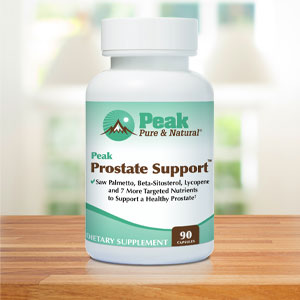Get Easy Health Digest™ in your inbox and don’t miss a thing when you subscribe today. Plus, get the free bonus report, Mother Nature’s Tips, Tricks and Remedies for Cholesterol, Blood Pressure & Blood Sugar as my way of saying welcome to the community!
Osteoporosis: Not just a woman’s disease

Osteoporosis is not just a women’s disease.
Men — especially men over 50 — need to protect their bone health, too.
Even though men in their 50s do not have the same rapid bone loss that women do, by the time men are between 65 and 70, they lose bone mass at the same rate as women. By those ages, both men’s and women’s calcium absorption decreases, bones become more brittle and the skeleton becomes weaker.
Osteoporosis is a silent disease that can progress without symptoms until you get a fracture. And perhaps surprisingly, the risk of an osteoporotic fracture in men is higher than the risk of prostate cancer.
Fractures occur most frequently in the spine, hip and wrist; and they can permanently disable you, accelerating your aging. In fact, men who fracture their hips are more likely to die from complications than women.
It is important to start taking measures to protect bone health early. Osteoporosis is treatable if detected before you lose significant bone loss. Focus on your lifestyle and vitamin D levels. Lifestyle factors that can improve your bone health include getting the right nutrition, doing weight-bearing exercise and being aware of medications you might take that cause bone loss. Managing your chronic diseases properly is essential to protecting your bone strength as well.
Bone-Loss Risk Factors For Men Include:
- Taking glucocorticoids
- Low T
- Smoking
- Excessive Alcohol
- Lack of exercise
- Age (risk increases with age)
- Race (Caucasian men are at higher risk)
- Chronic diseases affecting kidneys, intestines, lungs and stomach
Nutrition For Bone Health
Focus on getting adequate vitamin D. Your body needs vitamin D in order to absorb calcium and to form the hormone calcitriol, which is known as the active vitamin D. When vitamin D is depleted, you cannot absorb enough calcium from diet and the body takes calcium from your skeleton. This weakens your bones and prevents you from forming strong, new bones.
Your body makes vitamin D from exposure to sunlight. But many men do not get adequate sunlight or adequate vitamin D production, especially as they age. Taking a vitamin D supplement is recommended. Changing hormones and a testosterone deficiency can cause bone loss, so protecting against that bone loss with both vitamin D supplementation and managing your hormone levels naturally is a helpful strategy.
You may be surprised to learn that you should only take a calcium supplement if a doctor advises. According to Erin Michos, MD, MHS, associate director of preventive cardiology for the Ciccarone Center for the Prevention of Heart Disease, “The body can’t process more than 500 milligrams of calcium at a time. If you take a supplement with more than that, your body has to do something with the excess. It’s possible that higher calcium levels in the blood could trigger blood clots or that calcium could be deposited along artery walls, which would contribute to the narrowing of blood vessels.”
Food sources of calcium such as spinach, kale, broccoli, almonds, tofu, chia seeds, sesame seeds, figs and white beans supply the body with minerals and micronutrients help assist calcium metabolism and benefit your bone health.
How Much Vitamin D Do You Need?
There is much confusion about how much vitamin D a man needs. But what is very clear is that vitamin D deficiency is related not just to poor bone health but also linked to many other diseases (like heart disease and diabetes) and cancers (such as prostate cancer and colon cancer), so making sure your vitamin D is adequate is an important part of your health. In addition, vitamin D can help with hair growth, brain function, weight and testosterone levels, which are all concerns of most aging men.
It is easy to remedy a vitamin D deficiency. Get 20 minutes of unprotected sunlight every day, and take a daily vitamin D supplement. Almost 45 percent of Americans are deficient. Have your doctor check your vitamin D levels regularly to make sure you are on the right track.
The International Osteoporosis Foundation recommends that adults over 65 should take 800 to 1,000 IU of vitamin D each day. They also recommend that men who are obese, have osteoporosis, do not absorb vitamin D well or have limited exposure to the sun should take 2,000 IU each day.
The bottom line is to start taking care of your bone health and keeping an eye on your vitamin D and other hormone levels. Whether you are a younger male or over 50, stay active, keep exercising and eat a diet rich in non-dairy, calcium-rich foods.
If you are in a high-risk group or over 70 years old, get a bone mineral density scan. Don’t smoke. And if you drink alcohol, drink no more than two drinks per day. It is important to manage any health conditions you have. Maintaining good, healthy bones is an important part of aging and will help keep you active and strong into your later years.
Editor’s note: There are perfectly safe and natural ways to decrease your risk of blood clots including the 25-cent vitamin, the nutrient that acts as a natural blood thinner and the powerful herb that helps clear plaque. To discover these and other secrets of long-lived hearts, click here for Hushed Up Natural Heart Cures and Common Misconceptions of Popular Heart Treatments!














